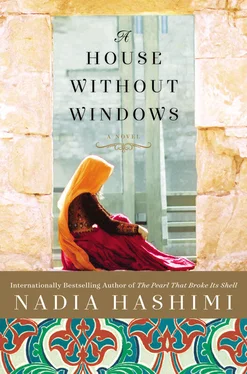Gulnaz pulled her shoulders back sharply. She shook her head.
“You’ve misunderstood me.”
“No, I don’t think I have,” Qazi Najeeb said.
“I’ve come to you with the truth,” Gulnaz insisted.
“You think you’re so smart. You always have.”
Had she done her daughter any good by coming here or had she simply made matters worse? She would call Yusuf tonight and tell him what she had done. The judge knew it all now, for better or worse.
The sun was nearly hidden behind the mountains now. Sunsets were odd in that sense — seeming to move in accelerated time. It was Wednesday, and this was the last sunset before the judge would announce Zeba’s sentence. After that, how many sunsets would her daughter have left and how quickly would they pass? Time had never pressed on Gulnaz’s heart as it did now that days and hours measured her daughter’s life. Gulnaz lowered her gaze slightly so the judge wouldn’t see that her bewitching eyes had misted.
“It doesn’t matter what I think, Qazi- sahib . That’s the problem. This world revolves around your opinion and your opinion alone.”
“I don’t think there’s anything more to say on the subject,” he said, not knowing what to make of her comment.
“No,” Gulnaz said slowly. Her throat was thick with angst, and it was an effort to get the words out. “I suppose there isn’t. But I’m sure you have plenty to think on tonight, so I’ll let you get back to your walk.”
She had attempted to reason with this man, to appeal to his decency on behalf of her daughter. But so often reason did not seem to work with people, which was precisely why she’d spent a lifetime getting her point across by other means.
She turned her back to the judge, and he resumed his walk. He was only a few meters from her when it happened, close enough that she could hear the light clinks and his soft gasp. Tap, tap, tap. It was not unlike the sound of hail on a roof. Gulnaz did not have to turn to see it. She closed her eyes for a second and imagined the scene behind her back, feeling a twinge of satisfaction. She pictured Najeeb, mouth half open, nothing but a tassel in his open palm. How many times had he worked his way through those thirty-three perfectly oval stones? Still it came as a surprise to Qazi Najeeb, who gave such little thought to the thin line of thread that held the stones together.
Hidden from view, the string of the tasbeh had frayed to nothing, sending the beads scattering to the hardened earth.
“WHEN I WAS A GIRL, I BELIEVED THERE WOULD BE ONE JUDGMENT Day for us all,” Bibi Shireen said. She sat cross-legged next to Zeba, her upper half swaying almost imperceptibly from side to side. Her eyes fluttered as she recalled the stories she’d been told time and again in her youth. “There are the signs of Judgment Day: the earthquakes coming one after another, people disregarding their prayers, heathens running through the streets. The mountains would flatten and the moon would splinter to warn us that Judgment Day was closing in. Those beastly creatures, Yajuj and Majuj, would be let loose and swarm the earth and wreak havoc among us. I believed that the dead would be resurrected, all of us glowing with youth and waiting to cross the thorny Bridge of Sirat together. Some would fall into the hellfires below, but the righteous would reach the other side where Heaven awaited.”
Nearly half the prisoners of Chil Mahtab had gathered in the yard, where they sat in a semicircle around Malika Zeba. Word had spread that she would be sentenced to hang in the afternoon. The temperature had dropped quite suddenly so that the women could now sit outside without fanning themselves. A half dozen rolled-up sleeves revealed Zeba’s name inscribed on forearms. The mood was somber.
“And what do you believe now?” Latifa asked.
Bibi Shireen’s eyes closed tightly. She dabbed at the corners of her eyelids with the end of her head scarf. Her voice was thin and choked.
“Now I believe Judgment Day happens every day. Every day. Why, God, were so many of us created only to be sacrificed?” she lamented to the sky.
Zeba rested her hand on Bibi Shireen’s.
“She’s right.” Heads swiveled to look at a woman who’d been sentenced to twenty years for running away. It had not mattered to the judge presiding over her case that she’d had three broken bones and a stab wound to her leg at the time she’d fled her husband’s house. Her voice sang out:
“Our womanly blood men seem to revile
While the rest of our blood brings them a smile.”
“I have one, too,” called another, hesitantly. Zeba recognized her as a woman who’d been betrothed to a man who had never bothered to claim her. When her family arranged her marriage to another man, the family of her uninterested fiancé reported her for zina out of spite. She was young, her complexion still plagued with acne.
“If an accusing finger is aimed your way
You’ll never see the light of day.”
The couplets had become a way for the women of Chil Mahtab to pass time. Some were clever and some were stilted. They were all bits of freedom, though, in a world where most of the women did not know enough of letters to sign their names. This had been Zeba’s unwitting gift to them.
Zeba was prepared for the judge to make his announcement today. She’d been prepared, she realized, since the very moment she’d been alone with Kamal’s body. It was the reason that she’d slumped to the ground and sat motionless, waiting for her children to come home and the world to discover what had happened. Basir, her neighbors, Yusuf, her mother, and even her father had all made valiant attempts to change her fate, but it was not to be.
The women of Chil Mahtab had clung to her, wondering if they were witnessing the last days of Malika Zeba. If a woman could be imprisoned or lashed for being seen with a man, she would surely be hung for murder. It was as if the prison had already begun to mourn her.
Zeba had spent the past two days distilling her prayers down to what was truly important. She wanted only for her children to speak her name without shame or resentment. She wanted them to think of her and know that she’d nurtured them as best she could, that she’d watched over them while they slept and cried when they’d lived forty days, and that she’d winced when they’d stumbled and scraped a knee. Food had no taste if she did not see her children enjoy it. She’d not felt alive until the moment she felt Basir stir in her womb. That was when time began, when the eyelash began to move across the dial and measure seconds, days, and months.
She hoped they would know all this.
Latifa snapped her fingers.
“I’ve got one! I’ve got one!” she called out. “It goes like this:
“These hardheaded men from their pulpits won’t budge.
How the world would be different if a woman could judge!”
There was a trickle of applause and a chorus of praise. Latifa beamed for a moment until the weight of her words fell upon her own ears. She looked at Zeba.
“I’m sorry,” she said softly. “Maybe it wasn’t the right time.”
“Latifa, what better time could there be? It was wonderful,” Zeba said. A box of chocolates was making its way through the crowd, generously shared by one of the prisoners. The women used a spoon to cut each sweet square into quarters, so that everyone could have at least a taste. “For a house with no windows, Chil Mahtab is not that bad. Sometimes I breathe easier here than I ever did at home.”
“Exactly,” called another woman. Zeba couldn’t see her face. She was embedded among the others, only identifiable by the hand she raised into the air like a flagstaff. “Malika Zeba, they call this place Chil Mahtab, because that’s the time we spend here. Forty moons at least. But you, you’ve lit these halls with the light of forty moons. No matter what happens, your name will be painted on the walls of this jail, in our blood if that’s what it comes down to, for as long as each of us stays here.”
Читать дальше











